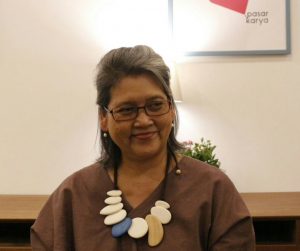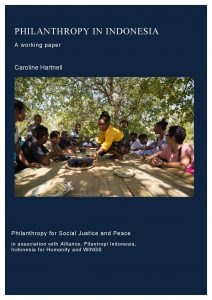 Indonesians began the year discovering that one in every five among them is now economically secure. According to the World Bank’s January 2020 report entitled Aspiring Indonesia , since 2002, the country’s 52-million strong middle class has been growing faster than any other income group. This matters not only for the country’s economic growth, the Bank says, but also for advancement in its citizens’ social and political roles. No wonder Caroline Hartnell’s overview of philanthropy in Indonesia shows a rather enthusiastic sector, with its many types of philanthropic organization – corporate, media, family, faith-based – and social enterprises. The lack of an enabling legal framework does not seem to fluster the dogged optimism within this nascent sector.
Indonesians began the year discovering that one in every five among them is now economically secure. According to the World Bank’s January 2020 report entitled Aspiring Indonesia , since 2002, the country’s 52-million strong middle class has been growing faster than any other income group. This matters not only for the country’s economic growth, the Bank says, but also for advancement in its citizens’ social and political roles. No wonder Caroline Hartnell’s overview of philanthropy in Indonesia shows a rather enthusiastic sector, with its many types of philanthropic organization – corporate, media, family, faith-based – and social enterprises. The lack of an enabling legal framework does not seem to fluster the dogged optimism within this nascent sector.
Meanwhile, the World Bank’s previous report, in 2015, was entitled Indonesia’s Rising Divide. It found that 15 years of sustained economic growth in Indonesia had primarily benefited the richest 20 per cent, thus making Indonesia more divided than ever before even in the measured opinion of this global institution. So, the 2020 optimism about Indonesia’s growing middle class needs to be couched in the reality that Indonesians who have become economically secure are leaving the other 205 million of their fellow citizens behind. The 2015 report describes the different ways to understand the divides, but to the layperson’s eye this all looks like deep injustices persistently unaddressed.
 In the overview of philanthropy in Indonesia, the SDGs are seen as one of three main drivers of philanthropy in Indonesia. The two others – disasters and technology – are triggers of giving and a means for its mobilization. The issue with the SDGs as a main driver of philanthropy is that, while it provides official recognition to existing initiatives in terms of the global agenda on ‘sustainable development’, it does not sharpen the focus on rights-based social justice and peace on the ground.
In the overview of philanthropy in Indonesia, the SDGs are seen as one of three main drivers of philanthropy in Indonesia. The two others – disasters and technology – are triggers of giving and a means for its mobilization. The issue with the SDGs as a main driver of philanthropy is that, while it provides official recognition to existing initiatives in terms of the global agenda on ‘sustainable development’, it does not sharpen the focus on rights-based social justice and peace on the ground.
In fact, current observation shows that most of Indonesia’s philanthropic institutions do not support rights-based social justice and peace agendas, which are often regarded as too risky or too political. A rights-based social justice approach carries out development-oriented initiatives together with building community understanding about the root causes and consequences of inequality. Such initiatives are carried out in the context of the overall goal of creating a just society. As the report describes, Indonesia’s various philanthropic organizations focus more on conventional development programming, service delivery or, in some cases, building tolerance across religions.
To someone who sees development and human rights as necessarily two sides of the same coin, this discrepancy between the growing philanthropy field and the lack of support to rights-based social justice initiatives on the ground is disturbing. Given the current government’s prioritization of infrastructure, investment and security, there is even more urgency to address Indonesia’s rising inequality in terms of its root causes in deep-seated injustices and to do so together with the country’s enlightened middle class.
Left unaddressed, this gap signifies a lost opportunity for Indonesia’s nascent philanthropy sector to be part of growing a citizenry – not just among the middle class but equally among the poor and marginalized – with a critical consciousness that aspires to eliminate all forms of injustice. Civil society organizations focused on a rights-based social justice and peace agenda remain on the sidelines of mainstream philanthropy – sadly, misunderstood, stigmatized or simply ignored.
Suzy Hutomo, a philanthropist who supports ecological justice and gender justice initiatives and one of Hartnell’s resource persons, says the work of these civil society organizations needs to be better communicated and the outcomes better understood. Essentially, all sides need to want this better understanding as well as being ready to work differently. This includes the international funding organizations that are also part of the status quo of philanthropy, in Indonesia and globally.
In the meantime, Indonesian civil society organizations doing rights-based social justice work are not waiting on the sidelines. On 10 February, Indonesia for Humanity hosted a meeting of minds among Indonesian ‘civil society resource organizations’ (CSROs) whose chosen role is to support rights-based social justice initiatives on the ground. As organizations without their own source of wealth and resources, these CSROs are not philanthropies and must depend on outside support while changing mindsets and the culture of giving in Indonesia.
In fact, our language is also quite distinct: it is more about resourcing rather than philanthropy, about sharing not giving. We understand that our voice needs to be heard and understood better. We also need support, not just financially – though funding is a huge and serious lack – but also socially and politically, if the effectiveness and sustainability of rights-based social justice and peace is to be recognized as a necessity for a better future for all.
Kamala Chandrakirana is a feminist advocate for human rights, justice and democracy. She sits on the governance bodies of civil society organizations working at the local, national, regional and global levels on a diversity of issues: women’s rights, community empowerment, transitional justice and human rights. She was a member of the United Nations Working Group on discrimination against women in law and practice at the UN Human Rights Council (2011-17) and secretary general then chairperson of Indonesia’s National Commission on Violence against Women (1998-2009). In the area of resourcing civil society, she is chair of the board of Indonesia for Humanity, a 25-year-old civil society resource organization, and of the Urgent Action Fund for Women’s Human Rights Asia and Pacific. She is also a member of Foundations for Peace, an international network of activist funds working in conflict-affected communities.